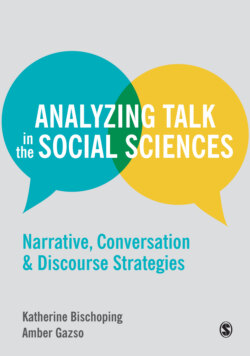Читать книгу Analyzing Talk in the Social Sciences - Katherine Bischoping - Страница 15
На сайте Литреса книга снята с продажи.
Knowing the Past through Oral History Ontology and Epistemology in the Realist Paradigm
ОглавлениеWithin the discipline of history, the 1960s and 1970s saw a fresh blossoming of oral history research, in which personal narratives were recognized as a valuable source of information about overlooked or obscured aspects of the past. At the outset of that new blossoming, historians had predominantly endorsed positivism. In response to the ontological question, ‘What can be known?’ positivist historians would say, ‘Facts about what took place in the past.’ (Historians have likewise tended to be realists, which means that they believe some real past does exist, independent of anyone’s observing it. If a tree falls in a realist’s forest, it always makes a sound.)
With regard to the epistemological question, ‘How do we know?’ positivist historians would answer that they are objective knowers, ones who observe the past from a neutral, value-free position. Thus, although many practitioners of oral history had avowedly political motivations for posing research questions about the hidden histories of subjugated groups, positivism informed how those in history departments defended the validity of their sources and analyses to colleagues accustomed to scrutinizing written sources. ‘Our analyses are valid because memories canbe accurate,’ the oral historians would have said, falling back to the position that if the vagaries of oral narrators’ memories and ephemerality of talk had tainted their data, so too had the subjectivity of the document writers of times past.
It was historian Luisa Passerini who, in 1979, made a significant intervention into her discipline’s paradigm with her interviews about Italy under fascism. Passerini (1979) maintained that the conflicted feelings that her working class narrators recounted did not taint her project of discovering the objective truths of the past so much as they served as truths of a qualitatively different character. That her narrators had felt their labor to be a moral duty at the same time as they found it alienating helped to explain why they initially did not revolt against fascism, but later did: their subjectivity held the seeds for revolt. Since Passerini’s intervention, oral historians in history departments have been far less apologetic about working with subjective data. In so doing, those seeking out the truths of the past have not had to abandon their positivist paradigm. As Guba and Lincoln (1994) explain, positivism can be stretched to incorporate and welcome subjective data, treating it as commensurate with what more objective sources offer. Thus, to technical analyses of the 1984 Bhopal, India industrial disaster, Mukherjee (2010) adds the voices of survivors as they recount their first glimpses of the strange white mist that would change their lives, their harrowing stampede for survival, and the continuing ordeal of unpredictable health conditions that they experience as monstrous.
